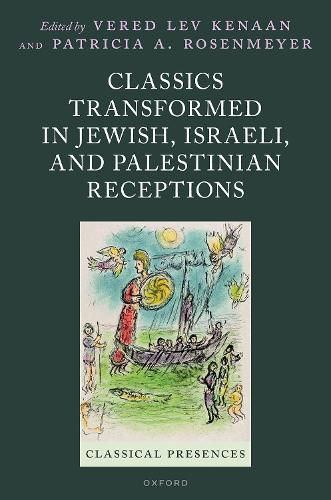Readings Newsletter
Become a Readings Member to make your shopping experience even easier.
Sign in or sign up for free!
You’re not far away from qualifying for FREE standard shipping within Australia
You’ve qualified for FREE standard shipping within Australia
The cart is loading…






Classics Transformed in Jewish, Israeli, and Palestinian Receptions invites the reader to view classical antiquity through the writings of poets, translators, and scholars emerging from modern Jewish diasporas, Mandatory Palestine, and the State of Israel who engaged with Greek and Roman literary precedents. Whereas these voices have up to now been mostly studied independently of one another as separate fields of research, this volume brings some of these distinct voices, who nevertheless share a connection to Greco-Roman antiquity, into conversation with one another. Taking its cue from the crisis of humanism following the Holocaust, the chapters take as their themes the destruction of home, displacement, and different forms of wandering and homecomings, drawing connections to acts of translation and transmission of the classics to form a picture of cultural and textual states of alterity. The volume shows that Jewish, Israeli, and Palestinian responses to the classics are entangled and even complementary despite their different trajectories. The chapters included here focus particularly on critical moments in Jewish and Palestinian existence when the reception of classical humanism is closely linked to issues of survival. On offer here is a historically grounded investigation into the ways Jews, Israelis, and Palestinians have used classical antiquity and classical philology to validate their identity in a rapidly changing society.
$9.00 standard shipping within Australia
FREE standard shipping within Australia for orders over $100.00
Express & International shipping calculated at checkout
Classics Transformed in Jewish, Israeli, and Palestinian Receptions invites the reader to view classical antiquity through the writings of poets, translators, and scholars emerging from modern Jewish diasporas, Mandatory Palestine, and the State of Israel who engaged with Greek and Roman literary precedents. Whereas these voices have up to now been mostly studied independently of one another as separate fields of research, this volume brings some of these distinct voices, who nevertheless share a connection to Greco-Roman antiquity, into conversation with one another. Taking its cue from the crisis of humanism following the Holocaust, the chapters take as their themes the destruction of home, displacement, and different forms of wandering and homecomings, drawing connections to acts of translation and transmission of the classics to form a picture of cultural and textual states of alterity. The volume shows that Jewish, Israeli, and Palestinian responses to the classics are entangled and even complementary despite their different trajectories. The chapters included here focus particularly on critical moments in Jewish and Palestinian existence when the reception of classical humanism is closely linked to issues of survival. On offer here is a historically grounded investigation into the ways Jews, Israelis, and Palestinians have used classical antiquity and classical philology to validate their identity in a rapidly changing society.